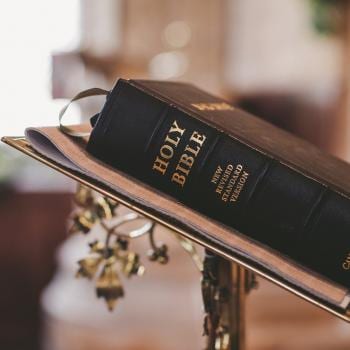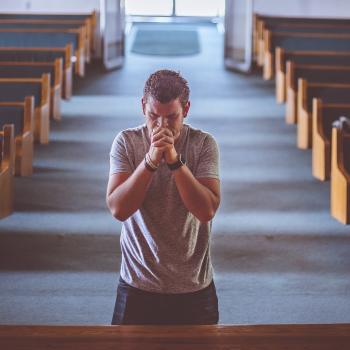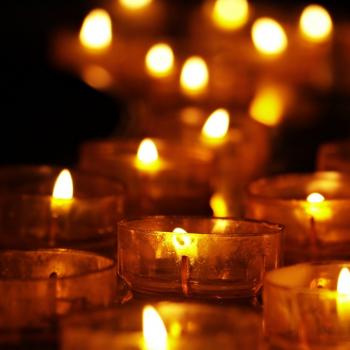Jill of Feministe wrote an excellent article in the Guardian last week:
Giving Thanks for My “Church”, Where the Civic Meets the Spiritual
Whether you believe, whatever you believe, we need churches – space for reflection and nourishment – and they deserve support
This Thanksgiving, I’m grateful for my church.
I’m grateful I have a space that offers moral guidance, that reflects and builds upon my values, that pushes me to be a kinder and more generous person and that offers me a sense of purpose. I’m grateful for the warmth and support of a like-minded community. I’m grateful my church is a space that is available to me every day, whenever I need it.
I’m grateful that, like so many other young, secular people across the globe, my church isn’t a religious institution or a hierarchy. It’s not even a church, technically. It’s the weekly dinner with the friends I’ve had for more than a decade. It’s the candle-lit yoga studio where I spend an hour every day quietly looking inward. It’s the comment section of my website, where a ragtag bunch of gender studies nerds, political junkies and social justice geeks have found each other, and where we argue and laugh and have a little reprieve from a real world where things are often ugly, painful and marginalizing – even while we talk about things that are ugly, painful and marginalizing.
The holiday that for me is the most spiritually rewarding, the one where I learn the most and reassess my path and give thanks and feel simultaneously peaceful and energized? It’s the annual New Years trip I take with my three closest friends, to somewhere new every year, with no boyfriends or partners allowed.
Almost all of us have a church. It just might not get a federal tax break.
Can I say how much I love Jill’s bait and switch?
In this article, Jill has an argument. She wants readers to expand their definition of “church” and give credit to the other ways people fill their needs for moral guidance, community, and purpose. In a sense, she wants to deprivilege religion and challenge the myth that religion fills some sort of need people have in a way nothing else does. And interestingly, she doesn’t challenge that myth by arguing that people don’t have the needs that religions claim to fill, but rather by arguing that religion isn’t the only way to fill those needs.
Fewer Americans than ever before attend formal religious services regularly. Religion is also waning across the rest of the western world. But that doesn’t mean that non-religious folks aren’t seeking out moral and spiritual teachings. We’re just recognizing that the traditional benefits of a church – community, advisement, charity, service, tradition, inspiration, confirmation that you’re a good person – don’t have to come along with values like casting non-believers to Hell, marginalizing people who don’t fit a particular ideal, subjugating women to secondary roles, or even a believing in a higher power.
Of course, there are some formal religious institutions that also embrace these values, and plenty of folks still rely on a church-church or on religious tradition. That’s great. But church-church no longer has a monopoly on church-like functions, and those of us who aren’t religious or those who, like me, feel alienated from the religion of our childhoods because of that church’s backwardness and bigotry, aren’t nearly as adrift or solitary as traditional church leaders seem to believe.
It’s not just that we the un-churched have whole and fulfilling lives without religion; it’s that part of what makes our lives whole and fulfilling are the non-religious institutions we have created and invested in.
Can I say how much I love what Jill is doing here?
Religion, like any other manmade philosophy, belief system or undertaking, can be good or bad; it can serve or it can damage, and it often does both at once. Many religions claim to offer a Truth that the institutions I value don’t. Many of them rely on hierarchies that too often lead to abuses of power and abuses of other humans. Some discourage rationality and inquiry, and instead, claim to hold all the answers. Many of them exclude and scapegoat some of the most vulnerable in society. Many of them give their members an inflated and narcissistic belief in their own righteousness, and a dangerous sense of entitlement – to political power, to a particular social model, to a place in the majority, to a piece of land, to a seat in heaven.
Religion necessarily requires faith – and some religions demand that the faithful not only believe, but adhere blindly and unquestioningly to the doctrine handed down.
Yet, religion also fosters community. It’s a way to make sense of a hectic and confusing world, and to find people who are making sense of the world in the same way. It’s a gathering of your own people. It offers absolution. It gives us rules to live by and helps to create a set of the shared values and beliefs that keep a society functional. It can encourage academic and spiritual exploration. It offers hope and light when we feel alone and lost. It promises to answer “why,” to give us a reason for our existence and a justification for the hardships we face. It maintains traditions, sometimes thousands of years old, through which we can understand who and where we are, connect to a past and situate ourselves in the long trajectory of human existence.
I think Jill’s point here is important, and it is one that I’ve seen made before. Lots of bad things happen in the name of religion, but good things happen in its name as well. Religion may often come along with hierarchies, but it also provides community. And so on. There is bad, and there is good. This is not to say that religion is necessarily neutral, but rather that regardless of what one thinks of religion it does serve a function and play an important role in many people’s lives.
Sometimes when atheists urge people to leave religion behind they don’t seem to realize what they’re asking. Leaving religion does not just mean stopping believing in “an invisible sky fairy.” It means so very much more than that. And that, I think, is, as we shall see, why Jill’s project here is so important.
This column, then, isn’t meant as an affront to religion. It is meant to say that the world is better, kinder, more interesting, more progressive and more widely-serving when religion isn’t the only game in town.
I think about the gay teenager in a small conservative town whose internet access opens up a world where she can find other people like her, and even more people who will offer the support and friendship she might not get at home or from her peers.
Or the woman in rural Bolivia whose knitting collective provides not only an income for her family and the families and her co-workers, but an intimate circle of women who help each other thrive and who have each others’ backs.
Or the Tunisian kid who finds his truth at a rap show. Or the man who sees God’s face in his regular stroll through the woods. The sports team, the marathon, the meditation practice, the artists’ collective, the hour spent painting, the journaling, the corner bar, the annual fishing trip, the quiet dinner, the weekend hike, the internet community – there are myriad places we “go to church”. There are myriad ways to feed our souls, to gain knowledge, and to discover something divine.
Now it is true to some extent that Jill is playing fast and loose with definitions here. Words like “church,” “spiritual,” and “divine” have traditionally been inextricably tied to God-belief. But I also think that’s the point. It is this tie that Jill is challenging.
My husband Sean was raised in a religious family, but he has never had what he would call a “spiritual experience.” I tried to explain to him what it felt like to be so lost in prayer as to feel at one with God and through him the universe, or to be enraptured during a particularly moving hymn in church. Because he had never had them, he couldn’t understand what I meant by a “spiritual experience.” Then he and I went to a concert together and I watched as the music transformed him. We took a walk in the woods and I watched as nature thrilled his soul. I explained to him that the feelings people have when they have “spiritual experiences” are the same feelings he gets at a good concert or during a walk through a patch of wilderness, or while looking at the stars or studying physics. And then he understood.
Finding support and friendship, feeding our souls, forming meaning and purpose – these are all needs we have, and they are all needs that can be met by churches but can also be met elsewhere. Transcendent experiences, community, discovering the “divine” – Jill’s point is that in today’s world none of this is at all limited to what we generally call a “church.”
There are so many of us who benefit far more from the churches we’ve found and built than from those that long claimed a monopoly over the spiritual. There are many of us who benefit from both the traditional church and our non-religious spirit-rejuvenating spaces.
Jill’s task is one of de-centering. I’ve often heard atheists speak of the problems with privileging religion. Jill is making this same argument, albeit with slightly different rhetoric.
When people have the power to choose their church, they increasingly steer away from the religious ones. Unfortunately, in too many places around the world, religious institutions are the only acceptable churches. As that hegemony is challenged by an increasingly interconnected world, and by transparency, and by women’s rights, and by development generally, religious institutions either adjust or, more often, dig in, fostering extremism and losing more moderate followers. The Catholic Church’s recent admonishment of nuns who focused their efforts on serving the poor rather than on political opposition to birth control is a good example.
Societies are better-off when they have multiple avenues for community participation, intellectual inquiry and spiritual growth. We are all better served when we can find “our people”, and when we seek out a time for quiet and for reflection. That nourishment is a human necessity.
And then Jill delivers the whammy:
And that’s why we need more than sentimental Thanksgiving columns celebrating secular institutions. We need real investment in these institutions, in the US and abroad. Religious churches in the United States are exempt from paying taxes; instead, they should be treated like any other nonprofit organization, and have their service arms remain untaxed while the rest of the business pays their fair share. The billions of dollars in tax revenue from that change could be reinvested in all sorts of charitable groups and services, both secular and religious, to make sure that all Americans have a space to flourish. Internationally, fostering community organizations like women’s collectives, writing groups, sports teams, art classes and educational initiatives allow for social participation and leadership from wider swaths of the population. It allows for people to feel invested and proud in what they’re building, helping to stymie extremism and promote peace.
I am so on board with this. Jill has just spent the majority of her article arguing that churches are just one of a myriad of ways that human beings today fill their need for transcendence, community, purpose, and meaning, and now she takes this to the next step: treating churches like any other secular alternative. Jill broadens the definition of church so as to challenge the place we give religious churches in today’s society. I love it.
Churches-outside-churches is far from a silver bullet to solve our ills. And secular institutions won’t replace the role of a church for people who adhere to a particular religious tradition.
But perhaps, it’s time we started putting these life-affirming, heart-expanding places and establishments on similarly vaunted footing as religious houses of worship. Perhaps, it’s time we put our collective resources beyond a diversity of spaces to serve a diverse populace.
Perhaps, a few Thanksgivings from now, it won’t seem so silly to be thankful for all of the places we cultivate our communities and nourish our spirits.
I think Jill’s article is also an excellent example of what the growth of the “nones” means. The “nones” are the 20% of Americans who claim no religious affiliation. Not all of these nones are atheists and agnostics, and, in fact, most of them don’t define as such. But writ large, these are the people Jill is speaking of, the ones who find their sense of meaning and purpose, community and spirituality, in things like yoga, walks in the woods, book clubs, and blogs. And as these nones find other ways of meeting the needs traditionally met by churches, the privileging of churches may be challenged. And with the privileging of churches, so too the privileging of religion.
Religion may be one way of meeting humans’ needs for community, transcendence, purpose, and meaning, but it is not the only way. The religious often err in failing to admit this, but atheists too can err by not paying adequate attention to the pressing desire many secular adults feel to find other, non-religious ways to meet these same basic human needs.














